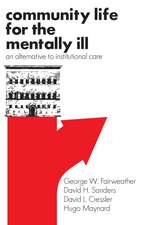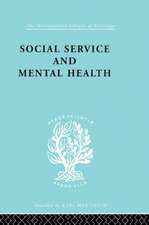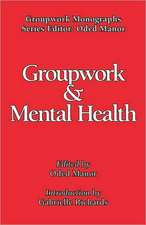Paradigms Lost: Fighting Stigma and the Lessons Learned
Autor Heather Stuart, Julio Arboleda-Florez, Norman Sartoriusen Limba Engleză Hardback – 28 iun 2012
Preț: 271.10 lei
Preț vechi: 336.59 lei
-19% Nou
Puncte Express: 407
Preț estimativ în valută:
51.88€ • 53.13$ • 43.16£
51.88€ • 53.13$ • 43.16£
Carte tipărită la comandă
Livrare economică 08-14 martie
Preluare comenzi: 021 569.72.76
Specificații
ISBN-13: 9780199797639
ISBN-10: 0199797633
Pagini: 240
Dimensiuni: 236 x 157 x 25 mm
Greutate: 0.45 kg
Ediția:New.
Editura: Oxford University Press
Colecția OUP USA
Locul publicării:New York, United States
ISBN-10: 0199797633
Pagini: 240
Dimensiuni: 236 x 157 x 25 mm
Greutate: 0.45 kg
Ediția:New.
Editura: Oxford University Press
Colecția OUP USA
Locul publicării:New York, United States
Recenzii
' Paradigms Lost is simply excellent. The chapters are clearly written and well organized and the material is relevant to the aim of the book, i.e., to inform those wishing to undertake anti-stigma programmes. I am sure that it will be a vitally important contribution to the field.'
'Paradigms Lost: Fighting Stigma and the Lessons Learned illustrates the long standing stigma attached to mental illness and its continued prominence today. Although the problem of stigma appears daunting, the authors offer an innovative approach to help combat social exclusion. Their proposed new paradigm constructs an optimistic and practical way to break down the social barriers to recovery'
'Stuart, Arboleda-Florez, and Sartorius provide a masterful tour-de-force of the scholarly literature to carefully unpack what we know about stigma so we can move ahead to eliminate its egregious impact. But their book does not end with a review of the science. They then provide a practical, hands-on guide to setting up anti-stigma programs meant to reflect the wisdom of their reviewed paradigms.'
'This extraordinary book by international experts stands on its head the accepted wisdom about fighting the stigma of mental illness. This is the most important book yet published on what we must do to reduce the insidious and powerful force that can paralyze attempts to improve recovery from psychiatric disorder'
With a unique 2 part format that addresses stigma but also personal clinical and field experiences, this book is a historical compendium with a passionate call to action. To help readers move ahead quickly, tip sheets and assessments are included. The boldness of the statements in this book are refreshing and should help fight stigma around the world to improve the lives of people living with mental illness. Hats off to the publishers for recognizing the importance of this work.
We are all opposed to the stigma of mental illness, but that is not enough. We needed this book to remind us of what we previously misunderstood, and to reinforce what we now know. As Kuhn said, looking at a contour map, the student sees lines on paper, the cartographer a picture of a terrain. We may be redrawing our old map, but we have not as yet found a new one.
'Paradigms Lost: Fighting Stigma and the Lessons Learned illustrates the long standing stigma attached to mental illness and its continued prominence today. Although the problem of stigma appears daunting, the authors offer an innovative approach to help combat social exclusion. Their proposed new paradigm constructs an optimistic and practical way to break down the social barriers to recovery'
'Stuart, Arboleda-Florez, and Sartorius provide a masterful tour-de-force of the scholarly literature to carefully unpack what we know about stigma so we can move ahead to eliminate its egregious impact. But their book does not end with a review of the science. They then provide a practical, hands-on guide to setting up anti-stigma programs meant to reflect the wisdom of their reviewed paradigms.'
'This extraordinary book by international experts stands on its head the accepted wisdom about fighting the stigma of mental illness. This is the most important book yet published on what we must do to reduce the insidious and powerful force that can paralyze attempts to improve recovery from psychiatric disorder'
With a unique 2 part format that addresses stigma but also personal clinical and field experiences, this book is a historical compendium with a passionate call to action. To help readers move ahead quickly, tip sheets and assessments are included. The boldness of the statements in this book are refreshing and should help fight stigma around the world to improve the lives of people living with mental illness. Hats off to the publishers for recognizing the importance of this work.
We are all opposed to the stigma of mental illness, but that is not enough. We needed this book to remind us of what we previously misunderstood, and to reinforce what we now know. As Kuhn said, looking at a contour map, the student sees lines on paper, the cartographer a picture of a terrain. We may be redrawing our old map, but we have not as yet found a new one.
Notă biografică
Heather Stuart has been working in the field of stigma research for almost 15 years and is the co-founder and current Chair of the Scientific Section on Stigma and Mental Disorders for the World Psychiatric Association. Dr Stuart is Director, Masters of Public Health Program, Department of Community Health & Epidemiology and Associate Director, Queen's/Pan American Health/World Health Organization Collaborating Centre for Training in Psychiatric and Behavioural Epidemiology, both at Queen's University, Ontario, Canada. Dr Stuart is also the Senior Consultant for Canada's Opening Minds national anti-stigma/anti-discrimination initiative. Julio Arboleda-Flórez is Emeritus Professor, Departments of Psychiatry and of Community Health and Epidemiology and the Inmediate Past Head and Chief-of-Psychiatry at Queen's University in Ontario, Canada. Dr Arboleda-Flórez is a leading authority on legal psychiatry and human rights of the mentally ill. He is the Honorary Chair of the Forensic Section and a longstanding member of the Ethics Committee of the World Psychiatric Association, an Honorary member of several national psychiatric associations. Norman Sartorius was Director of the World Health Organization's mental health programme from 1977 - 1993, President of the World Psychiatric Association from 1993 - 1999 and has been President of the European Psychiatric Association since 1999. Dr Sartorius holds professorial appointments at the Universities of London, Prague and Zagreb and is Senior Associate of Faculty at Johns Hopkins University in Baltimore, MD. Dr Sartorius is among the world's leading authorities on fighting stigma, co-morbidity of mental and physical illness, public health aspects of psychiatry and psychiatric education.

















